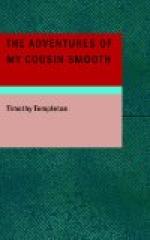great uncle got his knowledge of diplomacy up-stairs
or in the kitchen. The fruits of my research would
neither be interesting here, nor serve the object
I have in view. Enough is it to know that he
would now and then get into a funny vein, and in the
outpouring of his child-like enthusiasm, let out some
exceedingly rich jokes, touching the manner in which
certain gentlemen paid their, to him, most fashionable
debts. And, although the old man did at first
seem himself to enjoy the recital, he was as sure to
end in a great passion. And with every deference
to the feelings of certain of Mr. Pierce’s gentry,
who have so recently figured upon the stage of London
and Paris fashionable life, I may add that he would
testily declare nothing would so please him as to
cudgel every diplomatic dandy that brought disgrace
upon his country abroad and left his countrymen to
bear the smart. Indeed, he once honestly admitted
that foreigners were just foolish enough to look for
exponents of our national character among our representatives.
If they were not inclined to form the most exalted
opinion of it through that test, it was because they
never once took into consideration the nature of the
accomplishments necessary to our office-holders, at
the door of which the blame lay. My great-uncle
said that it was not that two or three conducted themselves
in a manner unbecoming their positions, but, that,
representing us in a national capacity, they saddled
the responsibility on their honester fellow-countrymen.
This, to me, had something about it I could not clearly
understand; but I have since thought that if my eccentric
uncle had lived to this day, and been in possession
of his crutch, a reckoning with General Pierce had
been the result. Either he had made the splinters
fly, or that worthy gentleman’s ear tingle with
certain facts relative to the manner in which his
gentry have strutted upon the stage we have before
mentioned. I say this of the old man because his
regard for the feelings of the nation was almost equal
to his reverence for the diplomatic body. And
I am sure he, in the earnestness of his soul, had
prayed Mr. Pierce to take into his pious consideration
the means of remedying an evil so gross as that of
his diplomatists making it the fashion of paying their
debts with that sacred character the comity of nations
has granted all missions. He would have told General
Pierce that he was but a man, whose little day would
soon pass on the wheel of time, but that the country
had a name to maintain among the nations, an exacting
posterity to account to! Will his men in the
bye-ways have done anything to which it may recur with
pride? The stages we have twice named can answer.
“The story of Mr. Secretary Bolt, as facetiously related by my great-uncle, when in one of his funny moods, may not be inappropriate here, inasmuch as it bears a strong resemblance to certain realities perpetrated at this day, but which my habitual modesty forbids me transcribing here.




